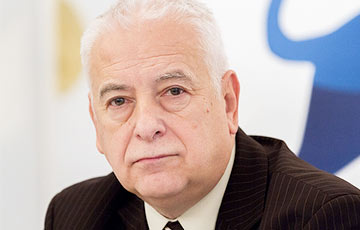Viktor Ross: Protest In Armenia Aimed Against Policy Of 'Tough Generals'
2- 18.04.2018, 14:17
- 28,336

PHOTO: CHARTER97.ORG/IVAN MIAZHUI
The European way, for which the opposition is struggling, is more beneficial for the country.
Former Poland's Ambassador to Armenia, one of the heads of the program named after kalinouski in the Warsaw University Vikrot Ross told this to Charter97.org, commenting upon the now happening mass riots against the government in Armenia:
- What is the peculiarity of the current protest actions in Armenia, and what is the reason thereof?
- Already for the four presidential terms, the power in Armenia is held by the same force - the Karabakh generals who once won the war against Azerbaijan and gained power in Yerevan.
Their power is authoritarian, but with some peculiarities: it is not such a tough authoritarianism as in some countries, since the real opposition is represented even in the parliament.
Nevertheless, the ruling Republican Party of Armenia has absolute supremacy in the legislative body of the country, therefore the power is concentrated in the hands of one force.
Previously, protests were regularly held in connection with falsifications at regular parliamentary or presidential elections. Now there is a new form of opposition, headed by Nikol Pashinyan, who created a bloc called "Elk" ("Exit") with the party "Republic" of Aram Sargsyan and "Light Armenia" of Edmond Marukyan.
Pashinyan is a well-known political figure in Armenia. He supported the opposition presidential candidate Levon Ter-Petrosyan in 2007, then was on the run, arrested and granted amnesty in 2011. Now he heads a political bloc protesting against the constitutional changes and the approval of Serzh Sargsyan, who has already served two presidential terms, as Prime Minister. And the changes in the Constitution mean that, for the third time, he will have all the powers as a Prime Minister of the parliamentary republic.
The actual third term does not suit the protesters for various reasons. This is the very personality of Serzh Sargsyan, who continues the policy of Armenia's complete dependence on Russia. The same forces protested when Armenia was a member of the Eurasian Economic Community, and believe that a much better way for the country would be to sign an association agreement with the European Union, which opens up entirely different economic opportunities.
- The protests leader Nikol Pashinyan called the events in Armenia a "velvet revolution". How precise such definition is?
- The protesters in the beginning worked out the following concept: starting on March 31, they begin a disobedience action, which will last 14 days in the cities of the country plus four more days in Yerevan itself. Protest marches were to include residents of many cities and villages - Gyumri, Sevan and others. But in the end, the leaders of the parties included in the "Elk" did not support Pashinyan. Only the political movement "Take a step, reject Serzh!" supported him.
Therefore, the only tool for the protesters was the mobilization of supporters and public opinion through social networks. They succeeded in blocking some state institutions, but the parliament still approved Serzh Sargsyan as a Prime Minister. In my opinion, now these protest actions will no longer have an effect.
- However, the protest actions continue. What is the point then?
- To demonstrate that Serzh Sargsyan's third term is unacceptable for many Armenians.Yes, Pashinyan called these events a "velvet revolution", but, in my opinion, this is a little exaggerated. In many respects, this is the matter in the person of Pashinyan himself. He is called Forrest Gump, by analogy with the character of the famous American drama film, who took a marathon run across the US.
- Will the ruling party correct its policy due to protests?
- I don't think so. The protest is precisely directed against the invariability of the policy of "tough generals".
Protesters are seeking more liberalization within the country and greater opportunities for the opposition. But the democratization of the society is hampered by the geopolitical factors.
- How does geopolitics affect the situation in the country?
- The country is in fact blockaded: Turkey, Azerbaijan, uneasy relations with Georgia, far-reaching dependence on Russia - the country that has an Armenian diaspora five times bigger than the population of Armenia.
The opposition would like to achieve, also relying on the Armenian diaspora in the world, rapprochement with the European Union, removing the obstacles to economic development. But now the Russian factor plays a big role and the country depends on the EurAsEC and the situation in the Russian Federation.
- What are other issues of the geopolitical situation, which complicate the choice of the European way for Armenia?
- Because of the unfinished Karabakh conflict, Armenia does not submit to the UN, which adopted a resolution condemning the Armenian presence in Karabakh. The peace treaty was never signed, there is only a ceasefire.
Azerbaijan is strongly supported by Turkey. And in the south, Armenia borders with Iran, which is an outcast country.
Therefore, Armenia is surrounded by unfriendly countries and the only hope is the ruling forces in Russia. And Russia plays in two directions at the same time, alternately supporting Armenia, then Azerbaijan, its main enemy. The situation for Armenia today is stalemate. Against this backdrop, Serzh Sargsyan decided to associate exclusively with the Eurasian Economic Community - a rather dubious organization in terms of prospects and opportunities, especially because of Russia's weak position in the world. The orientation towards the Eurasian Economic Community turns Armenia, in fact, into a "parasite", a small organism that does not receive reliable economic development from this.
- Would the Euro integration solve these problems?
- The opposition of Armenia is fighting for the European way of development. I think that they calculated the risks of withdrawal from the Eurasian Economic Community and understand that integration with the EU is more beneficial for the country. I am convinced that the EU provides much more opportunities and guarantees for the economic development.









